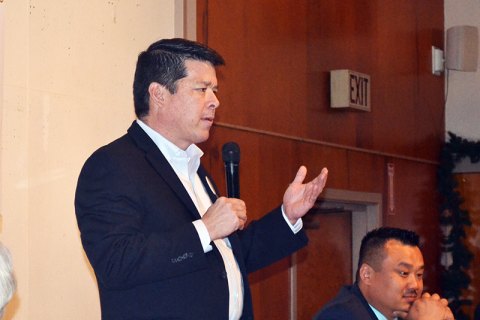Local congressman, TJ Cox, thoughts on House passage of updated Heroes Act

Rep. TJ Cox File Photo
“The COVID-19 pandemic has impacted every single part of our daily lives. We all know someone in the Central Valley who has had their business or their safety threatened by the Coronavirus. The CARES Act was a great step in helping Americans get through this crisis, but my colleagues in Congress and I knew more needed to be done. That’s why we passed the Heroes Act, to ensure that the American people got the assistance they needed to make it through this pandemic. I urge my colleagues in the Senate and the Trump administration to ensure this plan becomes a reality,” said Rep. Cox.
The updated Heroes Act includes important provisions that will help the people of the Central Valley.
For families, workers, and students:
- Provides $10 billion in additional funding for the Supplemental Nutrition Assistance Program (SNAP)
- Increases the SNAP benefit level by 15% and the minimum benefit to $30 per month until September 30, 2021, as well as temporarily lifts mandatory work requirements
- $400 million in special supplemental funding for Women Infant and Children (WIC)
- $450 million to help local food banks meet increased demand
- Provides additional direct payments of $1,200 per taxpayer and $500 per dependent
- Restores unemployment benefits, ensuring weekly $600 federal unemployment payments through next January
- $57 billion to support childcare for families
- Protects payrolls, by enhancing the new employee retention tax credit that encourages employers to keep employees on payroll
- Provides $2 billion for the purchase of Personal Protective Equipment (PPE) for essential workers
- Creates a deferred status for undocumented essential workers, protecting them from deportation
- $25 million for farmworker assistance and housing
- Requires OSHA to issue a strong, enforceable standard within seven days to require all workplaces to develop and implement infection control plans based on CDC expertise
For improving access to healthcare and strengthening our pandemic response:
- $1 billion in funding for medical school construction, expansion, and training in underserved areas
- $75 billion for coronavirus testing, contact tracing and isolation measures, ensuring every American can access free coronavirus treatment and supporting hospitals and providers
- $28 billion for procurement, distribution and education campaigns for a safe and effective vaccine
- Preserves health coverage, protecting Americans from losing their employer-provided health insurance by making unemployed Americans automatically receive the maximum ACA subsidy on the exchanges, as well as a special enrollment period in the ACA exchanges for uninsured Americans
For our frontline workers and state and local governments:
- Creates a $436 billion State and Local Coronavirus Relief Fund to cover COVID-related expenses, replace forgone revenues, and respond to the negative economic impacts of the pandemic
For our small businesses:
- Extends the Paycheck Protection Program (PPP) and allows unspent funds from the CARES Act to be utilized
- Authorizes additional funding for Economic Injury Disaster Loans (EIDL) and EIDL emergency grants
- $25 billion for airline industry workers, extending the highly successful Payroll Support Program to keep airline industry workers paid through March 31, 2021
- Makes adjustments to the Paycheck Protection Program, to help businesses keep their doors open, by:
- Creating more relief for the smallest businesses, struggling non-profits, and second loans to the hardest-hit businesses
- Delivering targeted assistance for the struggling restaurant industry and independent live venue operators
- Extending the covered periods to provide borrowers greater flexibility to use their loans
- Streamlining forgiveness for loans under $150,000
- Increasing eligibility for non-profits to include all 501c’s including labor unions and farm bureaus
- Expanding list of allowable uses for PPP funds to include PPE, supplier costs, and property damage costs
- Creating a set aside of 25% of remaining funding for distribution by community lenders, specifically CDFIs, CDCs, MDIs, and microloan intermediaries
For our farmers and producers:
- $30 billion in assistance to the agriculture sector, including:
- $500 million in additional funding to support specialty crop farmers and address COVID-19 supply chain issues
- $500 million for the dairy donation program to pay for milk processing and donation to non-profits like food banks
- $50 million to support beginning and socially disadvantaged farmers and ranchers
- $350 million in additional funding to support local farmers and farmers markets
- Provides $350 million to the Animal and Plant Health Inspection Service (APHIS) to ensure continued inspections of agricultural products in order to keep pests and diseases from entering the U.S.
- Provides supplemental dairy margin coverage payments to assist small and mid-sized dairies
- Provides emergency assistance payments for livestock and poultry losses
- Requires reporting on meat and poultry processing to increase resiliency and flexibility of processing capacity
The updated Heroes Act also maintains key priorities from the legislation that passed the House in May, providing the absolutely needed resources to protect lives, livelihoods and the life of our democracy over the coming months:
- Protects payrolls, by enhancing the new employee retention tax credit that encourages employers to keep employees on payroll.
- Bolsters housing assistance, helping struggling families afford a safe place to live with tens of billions in new supports to assist renters and homeowners make monthly rent, mortgage and utility payments and other housing-related costs – preventing homelessness.
- Safeguards our democracy, with new resources to ensure safe elections, an accurate Census, and preserve the Postal Service
Read the full revised Heroes Act text here.
Opinion
- Valadao supports rural cooperatives, communities with legislation
- Kings Democrats condemn vandalism at Rep. Valadao's Hanford office
- Breaking down barriers to care and protecting seniors' well being
- A public perspective on health care and Medicare Advantage
- The Leader recommends Lupe Solis, Joe Neves be returned to local elected positions
- Westlands Water District celebrates 70th anniversary in San Joaquin Valley
_0.jpg)

.jpg)



